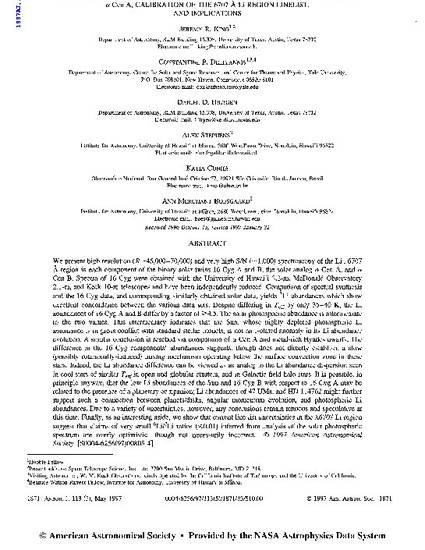
We present high resolution (R ˜45,000-70,000) and very high S/N (˜1,000) spectroscopy of the Li I 6707 Å region in each component of the binary solar twins 16 Cyg A and B, the solar analog alpha Cen A, and alpha Cen B. Spectra of 16 Cyg were obtained with the University of Hawai'i 2.2-m, McDonald Observatory 2.1-m, and Keck 10-m telescopes and have been independently reduced. Comparison of spectral synthesis and the 16 Cyg data, and corresponding similarly obtained solar data, yields 7Li abundances which show excellent concordance between the various data sets. Despite differing in Teff by only 35-40 K, the Li abundances of 16 Cyg A and B differ by a factor of >=4.5. The solar photospheric abundance is intermediate to the two values. This intermediacy indicates that the Sun, whose highly depleted photospheric Li abundance is in gross conflict with standard stellar models, is not an isolated anomaly in its Li abundance evolution. A similar conclusion is reached via comparison of alpha Cen A and metal-rich Hyades dwarfs. The difference in the 16 Cyg components' abundances suggests, though does not directly establish, a slow (possibly rotationally-induced) mixing mechanism operating below the surface convection zone in these stars. Indeed, the Li abundance difference can be viewed as an analog to the Li abundance dispersion seen in cool stars of similar Teff in open and globular clusters, and in Galactic field halo stars. It is possible, in principle anyway, that the low Li abundances of the Sun and 16 Cyg B with respect to 16 Cyg A may be related to the presence of a planetary companion; Li abundances of 47 UMa, and HD 114762 might further support such a connection between planets/disks, angular momentum evolution, and photospheric Li abundances. Due to a variety of uncertainties, however, any conclusions remain tenuous and speculative at this time. Finally, as an interesting aside, we show that current line list uncertainties in the delta6707 region suggest that claims of very small 6Li/7Li ratios ( 0.01) inferred from analysis of the solar photospheric spectrum are overly optimistic-though not necessarily incorrect.
